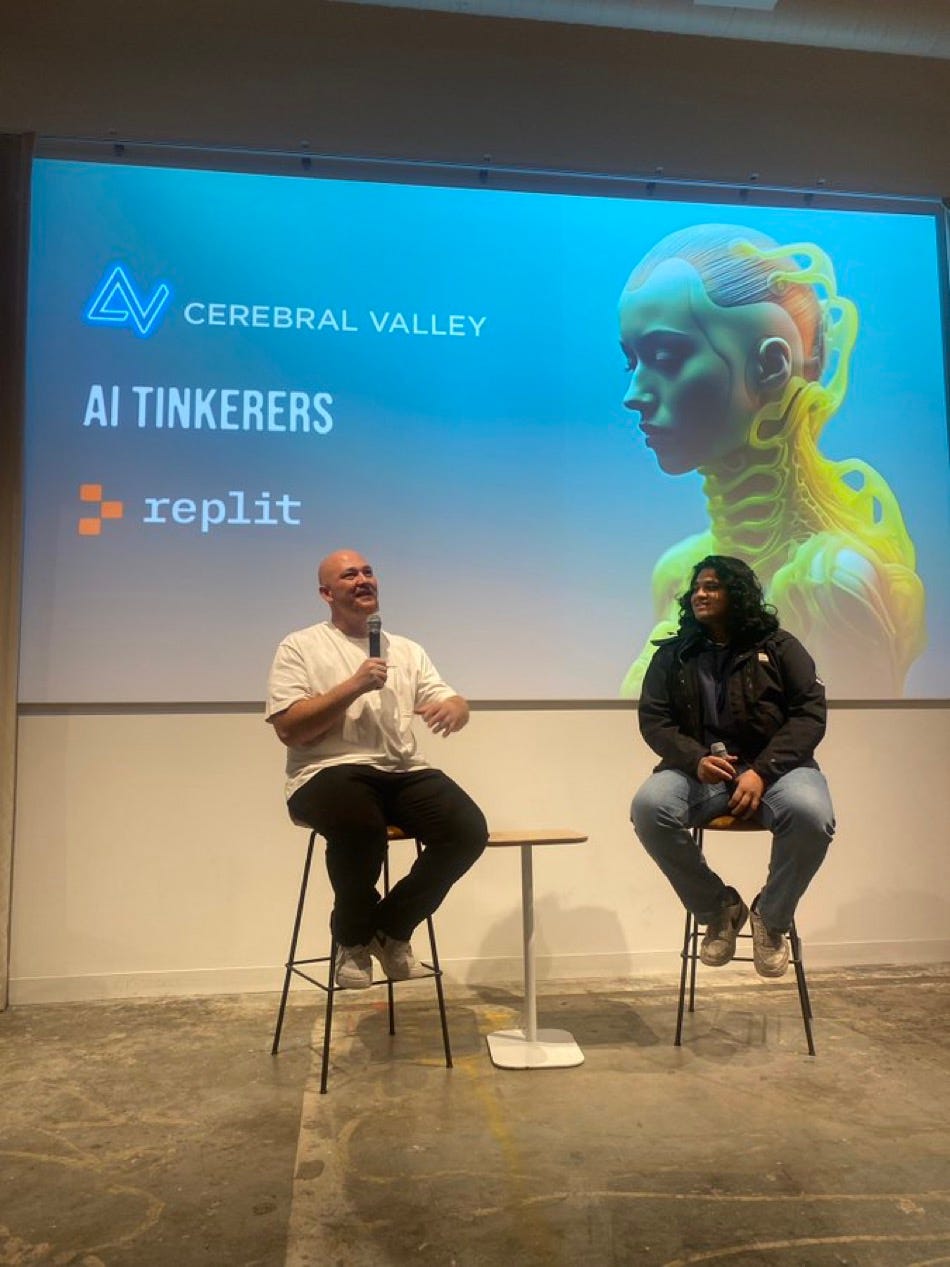AI Tinkerers SF X Cerebral Valley
12.3.23
Each edition of AI Notes will contain notes I take from live AI events in San Francisco.
This was an AI Tinkerers and Cerebral Valley event organized by Alex Graveley, Alex Tseng, Mickey Friedman, and Rahul Sonwalkar and sponsored by Replit. The event started with a fireside chat with Amjad Masad (CEO of Replit). Afterwards there were 5 minute AI demos. The event was filled with SF’s top AI enthusiasts, hackers, researchers, and engineers!
Fireside Chat: Amjad Masad interviewed by Rahul
How did Replit start? Can you talk about the tinkering years? Started as a mad-science project. Was an open source side project before it turned into a company around 2016. Original idea was around 2008. Launched on Hackernews in 2011 and people were really offended. But there was steadily more and more open source traction. 100k users in the first year.
What made you keep at Replit even though there were all these new apps store/mobile apps? By seeing that mobile was going to take over the world, it became pretty clear that software was going to take over the world. This led to more conviction in Replit. This thesis is still intact today in 2023. Amjad still thinks we need 100x more software.
What about interest in AI? Remembers reading about how Deep Blue beat Garry Kasparov (chess champion) and immediately knew that AI would eventually be able to write software too. The important distinction though was to focus on building something that people will use every day, which will take at least 10 years. It’s very different than building some cool/neat thing that people would use once or twice a month.
Where should people look at when looking to build things in AI? There are a lot of opportunities in tooling. Right now we are in early 2000s where things are shifting to the internet and you had to build a lot of tooling and infrastructure. Some of the biggest companies like AWS built internet infrastructure and tooling. One example, is “prompt rejection” which probably needs to be solved with tooling rather than with only research. Another example is tooling for data, since data is the most important part of training models. Ultimately think about what makes it easy for companies to use AI.
Amjad also believes that LLMs will be a part of the call chain of every function. Some functions will actually be LLMs. Therefore regression testing, type inference, and security need to be a lot better for this future to be true.
Right now AI is being adopted as a chatbot mostly, but not the core software.
What do you think future of coding will be like for programmers? Believes that it’s on a similar trajectory to self-driving cars. Here’s the analogy:
Level 0 - basic autonomy.
Level 1 - driver assist (cruise control, etc.)
Level 2 - hands on autonomy, like Tesla (have to have hands on steering wheel)
Level 3 - fully self driving
Coding is at level 1 today. The end state is full autonomy of programs writing programs (probably decades away). Copilot and Replit features already do level 1. Next step will be where you have to check every step (2-3 years from now), which will already expand what it means to be a programmer. Over a decade, everybody is a programmer.
The difference with self driving is that the world of possible programs that could be written are infinite, versus technically you could map out every street and path. So it’s tougher in that respect. On the slip side, it’s easier in other aspects such as being able to eval through all programming steps, or not having human drivers on the road that affect you. It’s definitely not a perfect analogy to self driving.
Other Notes:
You want a flywheel where your users create data and then you can use the data
AI GPU infrastructure is an inherently new thing
GPU compute will be more sought after. CPU are IO bottle neck. Programmers have not been bottlenecked by GPU for like 20 years. However, ML/AI does get bottlenecked by GPU.
——
Demos:
David + Varun: Latent Concept Matching (LCM) to bring you to a 3d render of any location - https://www.latentverseai.com
Marco: Junglegym - Open Source playground for building autonomous web agents - github.com/a16z-infra/junglegym
Emily: Combines ChatGPT Vision with figuring out where something is on an image by using a LLM to label all of the items on an image
Vidy: Generates native iOS apps with a text prompt - https://www.trace.zip
Saeed: Superpower ChatGpt - Extension to adds folders, saved prompts, custom instruction profiles, bookmarking and more to ChatGPT - superpowerdaily.com
Know someone who would benefit from getting notes from AI events in SF?
Have feedback on how I can improve or have additional notes from the event to add?


